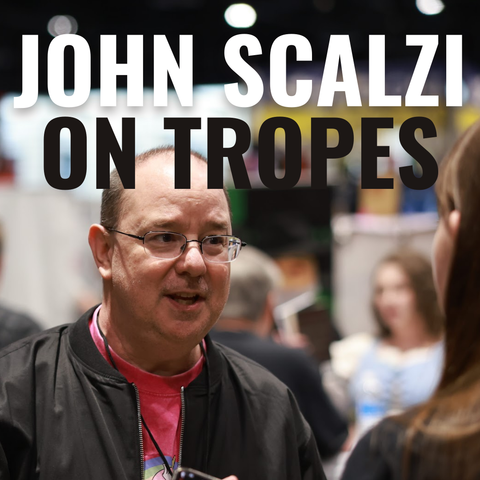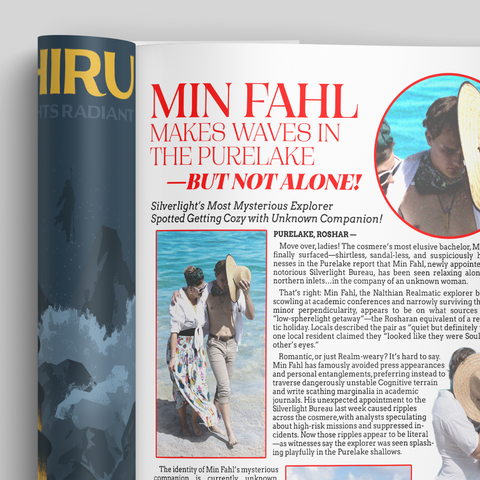At C2E2 this year, I ran into the infamous John Scalzi after a signing and had every intention of coercing him into answering a few questions about one of my most eagerly anticipated sci-fi releases of the year, When the Moon Hits Your Eye.
Scalzi’s latest work is now available everywhere books are sold—and while you absolutely should read it, our conversation took an unexpected and fascinating turn. We ended up diving into the merits of tropes across fiction, including the idea that authors may be missing a gold mine of insight into the human experience by desperately trying to avoid tropes altogether.
What Scalzi does instead (spoiler alert: it’s as clever and subversive as you’d expect) reframes the entire conversation around what tropes are actually for.
What Is a Trope, Though?
Before we dig in much further, it’s worth touching on a crucial point: not everyone shares the same definition of a trope in literature. For some, a trope is a cliché. For others, it’s a foundational storytelling pattern, a shorthand for emotional beats or narrative expectations. Scalzi’s view? Tropes aren’t inherently lazy, as many new authors are led to believe. Tropes are tools. And more than that, they’re artifacts of collective storytelling.
“I think the thing about tropes,” he told me, “is that you really do have to make sure they’re not taken at face value. If you just treat a trope as ‘read’—as something automatic—you’re missing what made it a trope in the first place.”
In other words, Scalzi doesn’t aim to subvert tropes by flipping them inside out (as I suggested). He says that’s still surface-level play. Instead, Scalzi treats tropes like archaeological sites. He digs beneath them to uncover the emotional and cultural strata that gave the trope power in the first place.
Yeah, my mind was blown too. Such a fantastic perspective.
Redshirts Had Dreams, Too
Take Redshirts, for example. It’s one of my favorite Scalzi works, and I’m sure it’s one of yours, too. Everyone knows the trope: the expendable crew member in sci-fi, marked for death before they even speak. But instead of poking fun at the trope, Scalzi used it as a lens to explore something deeper.
“The redshirt was one of the most motivated people in his class at the academy. He was on the flagship of the Federation. He had such a future. People expected great things. But then, he was eaten by a space badger,” Scalzi deadpanned.
That absurdity is deliberate. The trope tells you the character is disposable. The story tells you: no one is. “The whole point of Redshirts was actually looking at that. Every time I got into a trope, there was something underneath it that we’re not thinking about.”
It’s this commitment to exploring the quiet humanity beneath absurd premises that defines Scalzi’s work. His stories are often laugh-out-loud funny, but what lingers is the ache beneath the punchline.
Tropes Aren’t the Enemy. Shallow Thinking Is.
There’s a certain narrative, especially online, that young writers should avoid tropes at all costs. But in doing so, they often just create “anti-tropes,” inverted forms that are just as rigid and unexamined.
“Writers think they’re subverting tropes by doing the opposite,” Scalzi said. “But that’s just another trope. That’s not shape. That’s still a flat idea.”
Instead, Scalzi asks: What made this shape interesting to begin with? What human truth gave rise to this pattern? And how do we inhabit that space instead of dismissing it?
In Starter Villain, for instance, he plays with the idea of a James Bond villain but grounds the story in the practical realities of inheriting an evil empire. “They’re great for movies,” he states in this novel, “but what happens when you try to turn it into a sustainable business?”
It’s a perfect encapsulation of what makes his fiction tick: the larger-than-life reined back into the constraints of life. Whether it’s moon cheese or spy sharks, someone still has to deal with payroll.
The Moon Is Made of Cheese. You Still Have to Go to Work.
“Even in the most outlandish circumstances,” Scalzi said, “people are still people.”
That’s the tension at the heart of When the Moon Hits Your Eye. Yes, the moon is turning into cheese. But people still have to go to work. They still have bills. They still fall in love, grieve, argue, adapt. And that’s the magic of speculative fiction: the absurd sets the stage, but the human stakes remain painfully real.
Speculative genres like fantasy and sci-fi are typically set against a fantastical or otherworldly backdrop. That distance is part of what makes these genres so effective. As Scalzi explains, speculative fiction gives a bit of breathing room to reflect on our lives: “When the discussion that’s actually relevant to your life starts coming, you don’t necessarily have to feel attacked or heartbroken or hardened. You get that one little space where it lets you go, ‘Oh. I understand this now.’”
Science fiction, in Scalzi’s hands, becomes a sort of narrative safehouse. A way for readers to process grief, chaos, confusion without the immediate sting. His stories offer just enough absurdity to sneak something tender and true past your defenses.
The Secret Advantage of Speculative Fiction
“Humans are naturally storytelling creatures,” Scalzi told me. “We’ve been telling stories as long as we’ve had language—fables, fairy tales, myths.”
And yes, those stories can be dark. Often they offer moral clarity, or at least a path through the fog. But more than anything, they remind us we aren’t alone in trying to make sense of the world.
Big conversations begin with small ones. And tropes—those oft-maligned tools—are scaffolding for the small conversations. When they’re handled with care, they become maps to something deeper.
That’s what Scalzi does so well. He leads you in with a laugh, then hands you a mirror. He tells you the moon is made of cheese, and somehow, that helps you better understand your place in the world.



 https://www.dragonsteelbooks.com
https://www.dragonsteelbooks.com


Comments (0)
There are no comments for this article. Be the first one to leave a message!